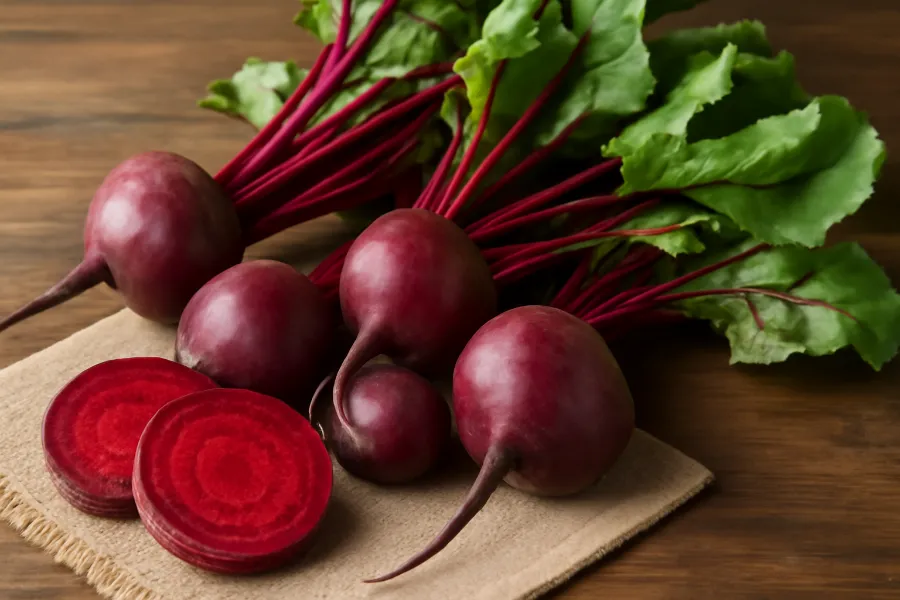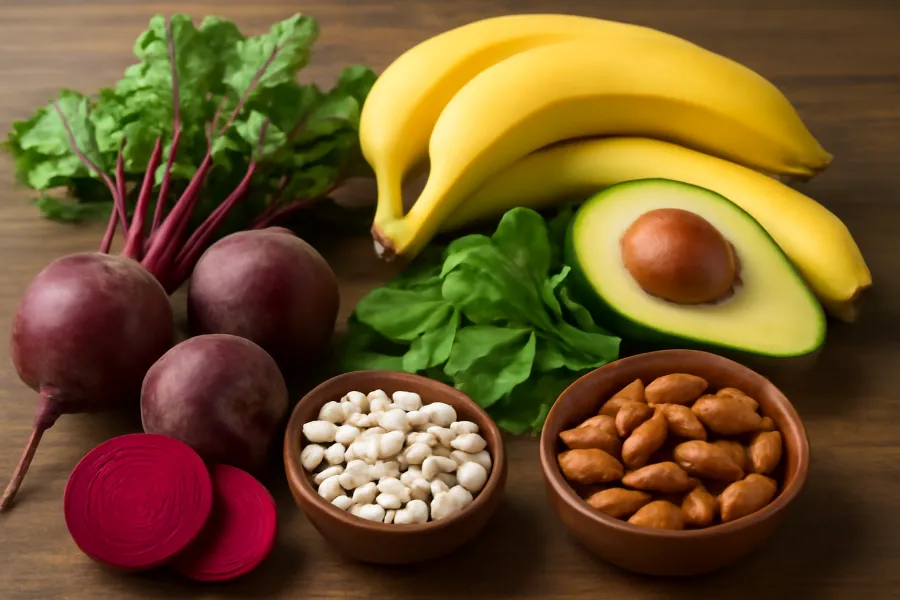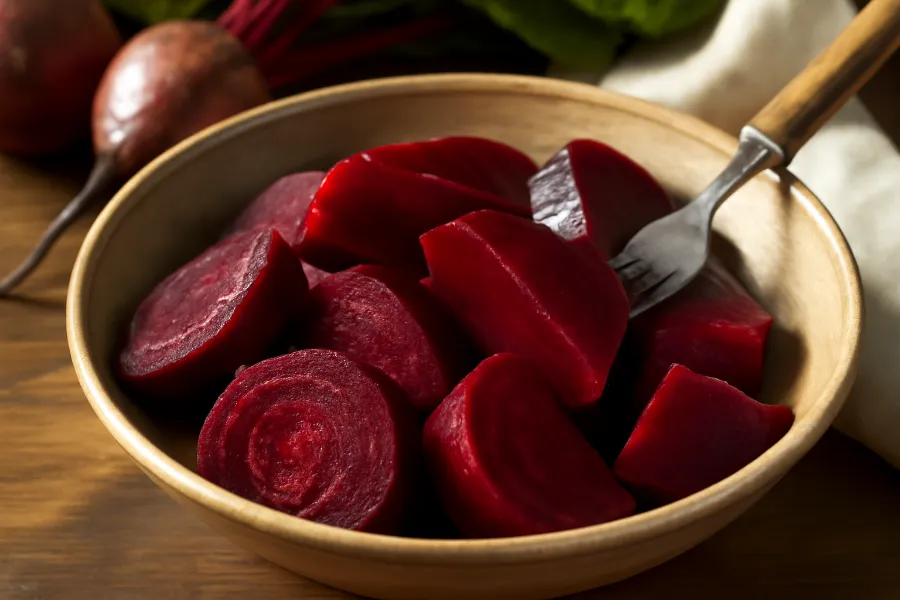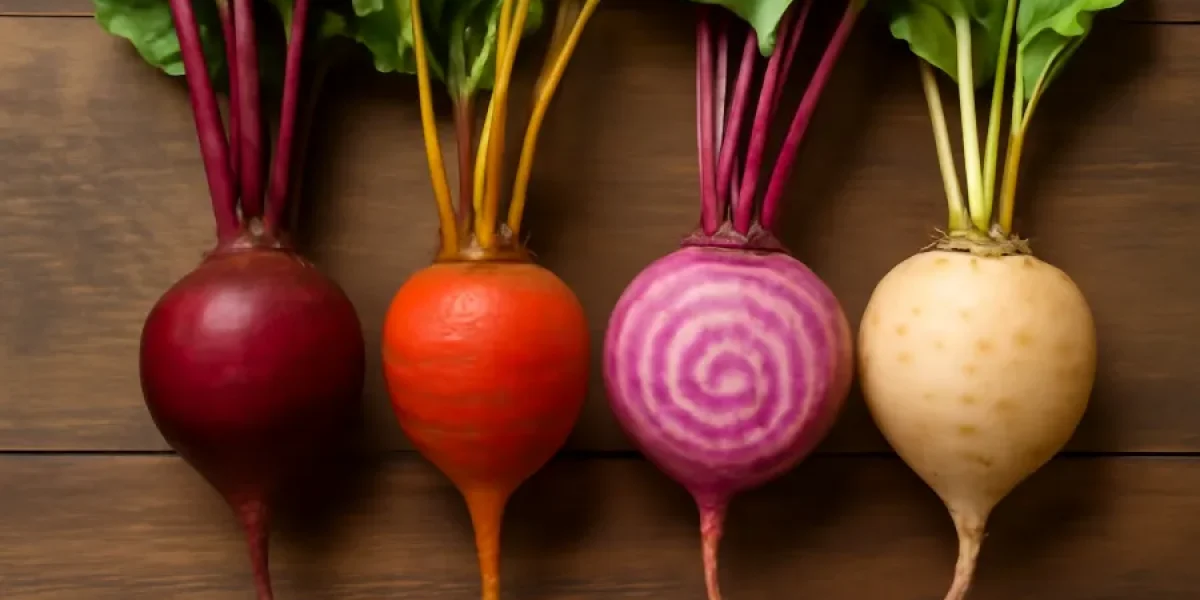If you’ve ever wondered about the nutritional benefits of beets, you’re in the right place. This humble root vegetable is far more than just a colorful addition to your plate—it’s a powerhouse of nutrients with a wide array of health benefits. Whether you’re consuming beets raw or cooked, they can contribute to your overall health and wellness in ways you might not have considered.
In this article, we’ll explore everything you need to know about beet nutrition, including the health benefits of beets, the nutritional profile of beetroot, the role of beta-carotene, why beets are considered potassium-rich foods, and how both raw beets and cooked beets contribute to your diet. By the end of this post, you’ll have a deeper understanding of why beets should be a regular part of your meals.
Health Benefits of Beets

Beets are not only delicious, but they also offer a variety of health benefits. Let’s take a closer look at how adding beets to your diet can improve your overall health.
1. Supports Heart Health
One of the most well-known benefits of beets is their positive impact on heart health. Beets are rich in nitrates, which are compounds that the body converts into nitric oxide. Nitric oxide helps relax and dilate blood vessels, improving blood flow and lowering blood pressure. Studies have shown that the nitrates in beets can have a direct impact on lowering blood pressure, making them an excellent choice for individuals looking to improve their cardiovascular health. In fact, some research suggests that just one serving of beets can help lower blood pressure within a few hours.
Moreover, the potassium content in beets further supports heart health. Potassium helps to counteract the negative effects of sodium in the body, which can lead to high blood pressure. Ensuring that your diet is rich in potassium can significantly reduce the risk of developing heart disease, stroke, and other cardiovascular conditions.
2. Anti-Inflammatory Properties
Another significant benefit of beets is their anti-inflammatory properties. Beets contain compounds like betalains, which are antioxidants that help fight inflammation in the body. Chronic inflammation is associated with many health conditions, including heart disease, diabetes, and cancer. By incorporating beets into your diet, you can help reduce inflammation and lower your risk of these chronic diseases.
The antioxidants in beets also help protect your cells from oxidative damage. Oxidative stress, caused by free radicals, contributes to aging and the development of various diseases. Beets, with their rich antioxidant content, can help combat this process and promote overall health.
3. Boosts Digestive Health
Beets are an excellent source of dietary fiber, which is essential for maintaining a healthy digestive system. Fiber helps to move food through the digestive tract, preventing constipation and promoting regular bowel movements. It also supports a healthy gut microbiome by providing nourishment for beneficial gut bacteria.
The high fiber content in beets makes them an ideal food for anyone looking to improve their digestive health. Additionally, beets contain natural compounds that can help detoxify the liver, further promoting healthy digestion and elimination of waste.
4. Enhances Cognitive Function
The nitrates found in beets don’t just benefit your heart—they can also enhance brain function. The increased blood flow and oxygen delivery to the brain that occurs after consuming beets can help improve cognitive function. Some studies have shown that the consumption of beets may help enhance mental clarity, focus, and memory, particularly in older adults. This makes beets an excellent food for promoting brain health and potentially reducing the risk of cognitive decline as you age.
5. Improves Athletic Performance
Athletes and fitness enthusiasts often turn to beets as a natural performance enhancer. The nitrates in beets improve blood flow, which allows for better oxygen delivery to muscles during exercise. This increased oxygen delivery can improve stamina and reduce fatigue, helping athletes perform better and recover faster. Several studies have shown that beetroot juice can improve endurance in athletes, making it a great addition to any workout routine.
Beetroot Nutrition: A Closer Look at the Nutrients

Beets are packed with essential vitamins and minerals that contribute to their nutritional benefits. Here’s a breakdown of the key nutrients found in beetroot nutrition:
1. Potassium-Rich Foods
Beets are considered potassium-rich foods and are an excellent source of this vital mineral. Potassium plays a crucial role in regulating blood pressure, supporting heart function, and maintaining proper fluid balance in the body. One medium beet (100 grams) contains about 305 milligrams of potassium, which is roughly 7% of the recommended daily intake. By incorporating beets into your diet, you can help ensure that you’re getting enough potassium, which is essential for overall health and well-being.
In addition to potassium, beets also contain smaller amounts of other minerals, such as magnesium, calcium, and iron. These minerals work together to support bone health, muscle function, and oxygen transport in the blood.
2. Beta-Carotene
Beta-carotene is a type of antioxidant that is found in many colorful fruits and vegetables, and beets are no exception. Beta-carotene is converted by the body into vitamin A, which is essential for maintaining healthy vision, skin, and immune function. While beets aren’t the richest source of beta-carotene compared to other vegetables like carrots or sweet potatoes, they still contribute to your overall intake of this important nutrient.
The antioxidant properties of beta-carotene help protect the body from oxidative stress, which can damage cells and contribute to the development of chronic diseases. By consuming beets, you’re adding a valuable source of beta-carotene to your diet.
3. Folate and Vitamin C
Beets are also a great source of folate (vitamin B9), a nutrient that is essential for cell function, tissue growth, and the production of red blood cells. Folate is especially important for pregnant women, as it helps reduce the risk of birth defects in the developing fetus.
In addition to folate, beets provide a good amount of vitamin C, an antioxidant that supports immune function, promotes healthy skin, and aids in the absorption of iron. Vitamin C is water-soluble, which means that cooking beets may reduce their vitamin C content. However, eating beets raw can help you retain the maximum amount of this important nutrient.
Raw Beets: Nutrient Preservation at Its Best
Eating raw beets is one of the best ways to preserve their nutritional content, particularly vitamin C and the natural enzymes that aid in digestion. When beets are cooked, some of their water-soluble vitamins, including vitamin C, are lost due to the heat. Consuming beets raw also allows you to retain more of their betalains, the antioxidants responsible for their anti-inflammatory effects.
Raw beets can be enjoyed in a variety of ways. Try adding grated raw beets to salads or blending them into smoothies for a nutrient-packed drink. If you’re feeling adventurous, you can even juice raw beets to create a refreshing and detoxifying beverage.
Cooked Beets: Easier to Digest and Rich in Beta-Carotene

Although eating raw beets is a great way to preserve their nutrients, cooked beets still offer significant health benefits. One of the main advantages of cooking beets is that it makes them easier to digest. Cooking softens the fiber and helps break down the starches, making the nutrients more accessible to your body.
Additionally, cooking beets enhances the bioavailability of beta-carotene, allowing your body to absorb more of this important antioxidant. Roasting or steaming beets is an excellent way to retain most of their nutrients while making them more palatable and easier to incorporate into a variety of dishes.
Vegetable Nutrition: Beets as Part of a Balanced Diet
Beets are an excellent addition to any vegetable-rich diet. They can be enjoyed in various forms, whether raw, cooked, or juiced, and can be paired with other vegetables, lean proteins, and whole grains to create a balanced, nutritious meal. By including beets in your diet, you can boost your intake of essential vitamins, minerals, and antioxidants, all of which contribute to your overall health.
Beets can be used in salads, roasted as a side dish, or even pureed into soups. They can also be added to smoothies or juices for an easy way to get your daily dose of nutrients. The possibilities are endless, making it easy to incorporate this vibrant root vegetable into your meals.
Conclusion: Why Beets Should Be a Regular Part of Your Diet
Incorporating beets into your diet is an easy and delicious way to improve your health. Whether you enjoy them raw or cooked, beets provide a wealth of nutritional benefits that can enhance your heart health, digestion, cognitive function, and overall well-being. With their high content of potassium, beta-carotene, and dietary fiber, beets are a versatile vegetable that can complement any meal.
The next time you’re at the grocery store, consider picking up some beets and experimenting with different ways to prepare them. Your body will thank you for it.
FAQs
Beets are rich in nitrates, which help lower blood pressure and improve heart health. They also support digestion, reduce inflammation, and boost brain function.
Raw beets retain more vitamin C and enzymes, which aid digestion. However, cooking beets increases the bioavailability of beta-carotene, enhancing its benefits.
Beets are packed with potassium, folate, fiber, vitamin C, and beta-carotene. They are also rich in antioxidants that promote overall health.
Beets are high in fiber, which promotes healthy bowel movements and digestion. They also contain compounds that support liver detoxification.
Yes, the nitrates in beets help improve blood flow and oxygen delivery to muscles, which enhances stamina and reduces fatigue during exercise.
Beets support heart health by lowering blood pressure and improving blood flow. They are rich in potassium, which helps regulate heart function.
Both raw and cooked beets offer significant benefits. Eating raw beets preserves more vitamin C, while cooking beets enhances beta-carotene absorption.













